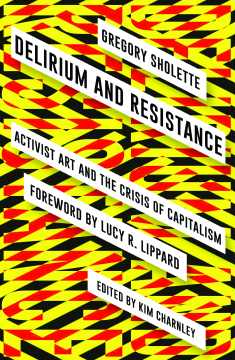
Additional Information
Book Details
Abstract
In the aftermath of the 2016 US elections, Brexit, and a global upsurge of nationalist populism, it is evident that the delirium and the crisis of neoliberal capitalism is now the delirium and crisis of liberal democracy and its culture. And though capitalist crisis does not begin within art, art can reflect and amplify its effects, to positive and negative ends.
In this follow-up to his influential 2010 book, Dark Matter: Art and Politics in the Age of Enterprise Culture, Sholette engages in critical dialogue with artists' collectives, counter-institutions, and activist groups to offer an insightful, firsthand account of the relationship between politics and art in neoliberal society. Sholette lays out clear examples of art's deep involvement in capitalism: the dizzying prices achieved by artists who pander to the financial elite, the proliferation of museums that contribute to global competition between cities in order to attract capital, and the strange relationship between art and rampant gentrification that restructures the urban landscape.
With a preface by noted author Lucy R. Lippard and an introduction by theorist Kim Charnley, Delirium and Resistance draws on over thirty years of critical debates and practices both in and beyond the art world to historicize and advocate for the art activist tradition that radically - and, at times, deliriously - entangles the visual arts with political struggles.
'A timely contribution to this ongoing global conversation between several generations of art activists around the ways in which their practice weaves between the contexts of art display, political campaigning and social movements'
Frieze
'Sholette is representative of a new artist type that emerged after Conceptualism in that his work as a critic, theorist, and curator is central to his practice as an artist. He is one of the most cogent artist-theorists currently working in the domain of social practice art'
Andrew Hemingway, Professor Emeritus of Art History, University College London
'Versed in the violent vicissitudes of political economy, Sholette is certainly better equipped than most who write about art and politics to analyze how the constraints on contingency exerted by capital can generate inescapable contradictions'
Art Asia Pacific
'Most of the themes explored in the essays will resonate with readers from other parts of the world. In particular the way major art events, galleries and museums exploit the pool of precarious workers and artists ready to work in exchange for ‘exposure’. Or the responsibility and failures of art education. Or the lack of demographic diversity,
especially at its highest levels of institutional governance. Or that abomination called artwashing'
We Make Money Not Art
'Shifting between artistic practice, curating, writing, and activism Gregory Sholette has been surfing the waves of activist art for more than three decades'
Gerald Raunig, philosopher and author of DIVIDUUM: Machinic Capitalism and Molecular Revolution, Part 1 (2016)
'Read this book and you will never see contemporary art the same way again.'
Guerrilla Girls
'[Sholette’s] insight provides a rare mix of emergence and history, strategy and conscious planning, enthusiasm and patience, a conjunction highly appreciated in a moment of superabundance of theories and ideals of emancipative action, not always followed by realist assessments of present political and cultural configurations'
Carlos Garrido Castellano, Afterall
'Sholette resists any simple solutions in Delirium and Resistance. Though the book is dense and meant to be read slowly, his writing is incisive and clear, and at times poetic with a savvy use of metaphor'
Gretchen Coombs, Brooklyn Rail
Table of Contents
| Section Title | Page | Action | Price |
|---|---|---|---|
| Cover | Cover | ||
| Contents | vii | ||
| List of Figures | ix | ||
| Abbreviations | xi | ||
| Acknowledgements | xii | ||
| Foreword: Is Another Art World Possible? - Lucy R. Lippard | xvii | ||
| Art on the Brink: Bare Art and the Crisis of Liberal Democracy - Kim Charnley | 1 | ||
| Part I: Art World | 17 | ||
| Introduction I: Welcome to Our Art World | 19 | ||
| 1. Fidelity, Betrayal, Autonomy: Within and Beyond the Post-Cold War Art Museum | 33 | ||
| 2. Let's Do it Again Comrades, Let's Occupy the Museum! | 47 | ||
| 3. Bare Art, Debt, Oversupply, Panic! (On the Contradictions of a Twenty-First-Century Art Education) | 53 | ||
| Part II: Cities without Souls | 79 | ||
| Introduction II: Naturalizing the Revanchist City | 81 | ||
| 4. Nature as an Icon of Urban Resistance on NYC's Lower East Side, 1979-1984 | 96 | ||
| 5. Mysteries of the Creative Class, or, I Have Seen the Enemy and They Is Us | 112 | ||
| 6. Occupology, Swarmology, Whateverology: The City of (Dis)Order Versus the People's Archive | 118 | ||
| 7. Art After Gentrification | 127 | ||
| Part III: Resistance | 149 | ||
| Introduction III: Critical Praxis/Partisan Art | 151 | ||
| 8. Counting on Your Collective Silence: Notes on Activist Art as Collaborative Practice | 167 | ||
| 9. Dark Matter: Activist Art and the Counter-Public Sphere | 184 | ||
| 10. On the Maidan Uprising and Imaginary Archive, Kiev | 203 | ||
| 11. Delirium and Resistance After the Social Turn | 210 | ||
| Postscript: December 2016 | 235 | ||
| Notes | 238 | ||
| Bibliography | 268 | ||
| Index | 277 |
